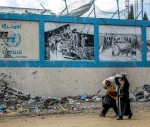You are here
The Trump shock in L. America
Nov 12,2016 - Last updated at Nov 12,2016
Despite US President-elect Donald Trump’s crude behaviour, insulting rhetoric, and vicious incitement over the past year and a half, the mantra in the coming days will inevitably be that it is time to move forward.
His opponent, Hillary Clinton, and President Barack Obama have already wished him a successful presidency.
Outside the US, the focus will be on damage control, to protect US-European relations, NATO, and ongoing diplomatic efforts in the Middle East.
But there is one world region that cannot possibly adopt a forward-looking attitude: Latin America.
For starters, since the start of his campaign, Trump has dismissed Mexico’s national interests and maligned its people’s character.
He has repeatedly promised to deport all 6 million undocumented Mexicans living and working in the US, and to force Mexico to pay for the construction of a wall on the US-Mexican border.
And he has said that he will renegotiate the North America Free Trade Agreement (NAFTA), scrap the Trans-Pacific Partnership (TPP) and discourage US companies from investing or creating jobs in Mexico.
It is rare to see an advanced democracy elect a leader who is so openly hostile to a neighbouring country.
And while Trump has not singled out any other Latin American countries in this way, his proposals would nevertheless affect many of them, if not all.
Every Central American country is a source of migration to the US, as are many Caribbean and South American countries.
Honduras, Guatemala, El Salvador, Cuba, Haiti, the Dominican Republic, Ecuador and Peru all have large populations of documented or undocumented nationals in the US, and they will all feel the effects of Trump’s policies, if they are enacted.
What’s more, countries such as Chile, which negotiated the TPP in good faith with the US, Mexico, Peru and Asian-Pacific countries, will now suffer the consequences of Trump’s protectionist stance.
So will the 10-odd Latin American countries that have concluded bilateral free-trade agreements (FTAs) with the US over the past 20 years.
In short, Trump’s election is an unmitigated disaster for the region.
But many Latin American countries may optimistically assume that he meant none of what he said for 18 months, that his policy proposals were nothing more than campaign rhetoric, and that he will be unable to implement most of his agenda in any case.
Wishful thinkers will argue that members of the Republican-led US Senate and House of Representatives are not nearly as protectionist as Trump, and would never agree to roll back existing FTAs.
Some might even believe that congressional Republicans will pressure Trump to embrace the TPP (or that Obama will push it through Congress before he leaves office in two months).
Similarly, some political observers in the US and Latin America may argue that Trump cannot possibly implement any of his hare-brained immigration policy proposals. The material and logistical challenges of actually rounding up millions of people and building a wall are simply too daunting.
Unfortunately, these expectations are naive.
Obama had no trouble deporting more than 2 million Mexicans and Central Americans during his eight years in office; and there is already a partition along more than 1,120 kilometres of the 3,140-kilometre-long US-Mexico border.
It is not hard to imagine Trump beating Obama’s deportation record and expanding the border partition by as many miles as his predecessors have since 1993, when construction began US president Bill Clinton.
Likewise, we have every reason to expect that Trump’s presidency will be bad for trade.
Trump owes his victory to voters in states that were negatively affected by NAFTA (and by China’s accession in 2001 to the World Trade Organisation), such as Ohio, Pennsylvania, Michigan and Wisconsin. What will all of the voters in these states say if Trump suddenly starts ratifying new FTAs?
Journalists, academics, businesspeople, diplomats and others worldwide are now struggling to determine what Trump’s presidency will mean for the future of international affairs. But one thing seems certain: the international order that emerged after the Soviet Union’s collapse in 1989 will change; business as usual will not continue.
No region will suffer more under Trump’s presidency than the Western Hemisphere.
For Americans and Latin Americans alike, the election of Trump has marked the start of a difficult road.
The writer, former foreign minister of Mexico (2000-2003), is professor of politics and Latin American and Caribbean Studies at New York University. ©Project Syndicate, 2016. www.project-syndicate.org













